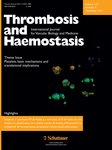
THROMBOSIS AND HAEMOSTASIS
Scope & Guideline
Unlocking Insights in Thrombosis and Hemostasis
Introduction
Aims and Scopes
- Thrombosis and Hemostasis Mechanisms:
The journal emphasizes research on the underlying biological mechanisms of thrombosis and hemostasis, exploring the molecular, cellular, and genetic factors that contribute to these processes. - Clinical Outcomes and Management Strategies:
A significant focus is placed on clinical studies that assess the effectiveness of various anticoagulant therapies, management strategies for patients with thrombotic disorders, and the implications of these treatments on patient outcomes. - Innovative Therapeutic Approaches:
The journal highlights studies that explore novel therapeutic approaches for managing thrombotic and bleeding disorders, including the development of new anticoagulants and antiplatelet agents. - Risk Assessment and Predictive Modeling:
Research on risk factors and predictive models for thrombotic events is a key area of interest, aiming to improve risk stratification and patient management. - Translational Research:
The journal publishes findings that bridge basic science and clinical practice, facilitating the translation of laboratory discoveries into therapeutic applications for patients with thrombotic disorders.
Trending and Emerging
- COVID-19 and Thrombosis:
A significant increase in research focusing on the relationship between COVID-19 and thrombotic events highlights the pandemic's impact on thrombosis research, emphasizing the need for understanding coagulopathy in infected patients. - Personalized Medicine in Anticoagulation:
Emerging studies emphasize the importance of personalized approaches to anticoagulation therapy, including tailoring treatments based on genetic, phenotypic, and clinical characteristics of patients. - Machine Learning and Predictive Analytics:
The integration of machine learning techniques for predicting thrombotic events and optimizing treatment strategies is gaining traction, reflecting a broader trend towards data-driven decision-making in healthcare. - Cancer-Associated Thrombosis:
Research specifically addressing the complexities of thrombosis in cancer patients is increasingly prevalent, focusing on the unique risk factors and management strategies required for this population. - Innovative Biomarkers:
There is a growing emphasis on identifying and validating novel biomarkers for predicting thrombosis and bleeding risks, which may enhance risk stratification and personalized treatment approaches.
Declining or Waning
- Traditional Anticoagulant Therapies:
There is a noticeable reduction in studies focused solely on traditional anticoagulant therapies such as warfarin, as newer agents like direct oral anticoagulants (DOACs) gain prominence in research. - Basic Science of Hemostasis:
Research that solely focuses on the basic science of hemostasis without practical clinical applications appears to be less frequent, as the journal shifts towards more clinically relevant studies. - Static Risk Factor Studies:
Studies that merely catalog risk factors without integrating them into predictive models or clinical applications are becoming less common, reflecting a trend towards more dynamic and actionable research. - Single-Center Studies:
There appears to be a decline in the publication of single-center studies as multi-center and larger cohort studies become the norm, likely due to the increased need for robust data in diverse populations. - Pharmacokinetics of Established Drugs:
Research focusing on the pharmacokinetics of well-established anticoagulants without new insights or comparative analyses is becoming less frequent, as emphasis shifts to novel agents and their clinical implications.
Similar Journals

Hematology Reports
Connecting ideas to improve patient outcomes.Hematology Reports is an esteemed academic journal in the field of hematology, dedicated to advancing the understanding of blood disorders and their treatment. Published by MDPI, a leading Swiss publisher known for its commitment to open access since 2009, this journal provides a valuable platform for researchers and healthcare professionals to disseminate innovative findings and foster collaboration within the academic community. The journal features an array of articles ranging from clinical studies to laboratory research, and is indexed in Scopus, where it currently holds a rank of 113 out of 137 in the Medicine - Hematology category, placing it in the 17th percentile. As an open-access journal, Hematology Reports ensures that critical research is accessible to a global audience, supporting the dissemination of knowledge that has the potential to improve patient outcomes. This journal is an essential resource for those engaged in the study and treatment of hematological conditions, encouraging dialogue and the exchange of ideas to enhance clinical practices.
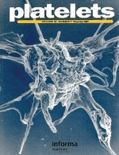
PLATELETS
Exploring the vital role of platelets in medicine.PLATELETS is a distinguished journal published by Taylor & Francis Inc that has been at the forefront of research in the fields of hematology and medicine since its inception in 1990. With an ISSN of 0953-7104 and an E-ISSN of 1369-1635, this journal boasts a solid reputation, as reflected by its Q2 ranking in both Hematology and Miscellaneous Medicine categories in 2023. PLATELETS serves as an essential platform for disseminating pioneering research, reviews, and case studies related to platelet biology, thrombosis, hemostasis, and their clinical implications. Although not an open-access publication, it is indexed in reputable databases, ensuring visibility and citation of quality contributions. Researchers, clinicians, and students alike will find valuable insights that may inform their work and enhance their understanding of the crucial role of platelets in health and disease. This journal's commitment to advancing knowledge and fostering innovation makes it a pivotal resource in the academic community.
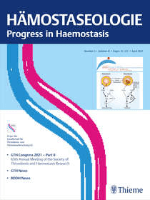
Hamostaseologie
Transforming Hematological Knowledge: Essential Insights for ProfessionalsHamostaseologie is a prominent academic journal dedicated to the field of hematology, published by GEORG THIEME VERLAG KG. With an ISSN of 0720-9355 and an E-ISSN of 2567-5761, this journal has been at the forefront of critical research and advancements since its inception in 1981, and it continues to maintain its relevance in the scientific community with a converged publication until 2024. Ranked in the Q3 quartile in Hematology for 2023, and positioned at #44 out of 137 in the Scopus Medicine Hematology category, it represents a substantial contribution to scholarly discourse. Researchers and professionals alike will find valuable insights within its pages, as it disseminates rigorous studies and reviews that address pertinent issues related to hemostasis and coagulation. While the journal does not currently offer Open Access, readers can access its valuable content through institutional subscriptions, making it an essential resource for students, clinicians, and researchers aiming to deepen their understanding of hematological science.
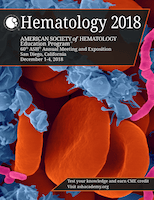
Hematology-American Society of Hematology Education Program
Empowering Knowledge in Blood DisordersHematology-American Society of Hematology Education Program is a premier peer-reviewed journal dedicated to advancing the field of hematology through comprehensive educational content. Published by the American Society of Hematology, this journal plays a crucial role in disseminating knowledge to researchers, clinicians, and students in hematology and related disciplines. With an impressive Q1 status in the field, it ranks among the top journals at the forefront of hematological research, as evidenced by its 60th percentile ranking in Scopus' Medicine - Hematology category. Although it does not offer open access, the journal provides invaluable insights and educational resources from leading experts, focusing on the latest advancements, treatment protocols, and evolving understanding of blood disorders. Covering a wide range of topics, from basic research to clinical applications, this journal is essential for anyone seeking to deepen their expertise and stay informed on the latest developments in hematology. For further engagement, readers can access insightful articles published since 2001, ensuring a rich repository of knowledge for ongoing research and clinical excellence.

CLINICAL HEMORHEOLOGY AND MICROCIRCULATION
Pioneering Insights into Clinical Hemorheology and MicrocirculationClinical Hemorheology and Microcirculation, published by IOS Press, is a distinguished journal dedicated to advancing the scientific understanding of blood flow mechanics and microcirculatory phenomena. Since its inception in 1991, the journal has been pivotal in bridging the fields of cardiology, hematology, and physiology, as evidenced by its placement in the Q3 quartile across several categories in 2023. Positioned in the vibrant academic landscape of the Netherlands, Clinical Hemorheology and Microcirculation offers valuable insights to researchers and practitioners alike, enriching their knowledge and fostering innovation in clinical practices. With an ISSN of 1386-0291 and an E-ISSN of 1875-8622, the journal serves as a vital platform for disseminating high-quality research and reviews that explore the intricate dynamics of blood viscosity and microvascular function, essential to both health and disease. As readers delve into the journal, they will access rigorous studies that not only enhance theoretical understanding but also pave the way for potential clinical applications, making it a crucial resource for those invested in the future of cardiovascular and hematological research.

Research and Practice in Thrombosis and Haemostasis
Innovating hematology through open-access insights.Research and Practice in Thrombosis and Haemostasis, published by Elsevier, is a prominent open-access journal dedicated to advancing the field of hematology through high-quality research and clinical practice. Since its inception in 2017, this journal has established itself as a vital resource for researchers, healthcare professionals, and students interested in thrombosis and hemorrhage management, showcasing original research, reviews, and clinical studies. The journal’s commitment to accessible knowledge is reflected in its open-access model, allowing researchers worldwide to share their findings without financial barriers. With an impressive 2023 Scopus rank of #42 out of 137 in the hematology category and a respectable Q2 classification, it provides an authoritative platform for innovative ideas and cutting-edge developments in the field. As the journal continues to grow in stature, it aims to foster collaboration and knowledge exchange amongst professionals dedicated to improving patient outcomes in thrombosis and hemostasis.
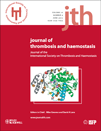
JOURNAL OF THROMBOSIS AND HAEMOSTASIS
Shaping the Future of Hematology and MedicineJOURNAL OF THROMBOSIS AND HAEMOSTASIS, published by Elsevier Science Inc, stands at the forefront of research in the fields of hematology and medicine, boasting an impressive ranking of #5 out of 137 in Scopus's Medicine - Hematology category, with a remarkable 96th percentile. As an essential resource for researchers, clinicians, and students, this journal, identifiable through its ISSN 1538-7933 and E-ISSN 1538-7836, encompasses pioneering studies and reviews that focus on the mechanisms of thrombosis and hemostasis, contributing significantly to advancements in patient care and therapeutic strategies. With an established presence from 2003 through 2024, it has consistently achieved a prestigious Q1 category ranking, reflecting its impactful contributions to the scientific community. Although it operates under a subscription-based model, the journal remains committed to disseminating significant findings that inform best practices in clinical settings and shape future research trajectories.
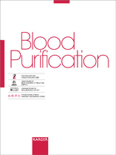
BLOOD PURIFICATION
Unveiling the Future of Blood Purification Technologies.BLOOD PURIFICATION is a distinguished peer-reviewed journal published by KARGER, recognized for its in-depth exploration of the interdisciplinary topics surrounding blood purification technologies and techniques, encompassing nephrology and hematology. Since its inception in 1983, this reputable journal has provided a vital platform for disseminating groundbreaking research, reviews, and clinical practices aimed at advancing the understanding and management of blood-related conditions. With an impressive impact factor positioned within the second quartile (Q2) in the fields of Hematology, Nephrology, and Miscellaneous Medicine (2023), BLOOD PURIFICATION is highly regarded among researchers and professionals dedicated to enhancing patient outcomes. The journal aims to foster a collaborative academic environment, sharing innovative findings and methodologies, making it an essential resource for scholars, clinicians, and students alike. This publication does not currently offer Open Access options, and is based in Switzerland, with its editorial office located at Allschwilerstrasse 10, CH-4009 Basel. Engage with BLOOD PURIFICATION to stay at the forefront of advancements in blood purification science.
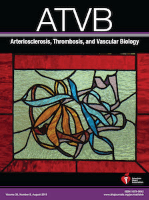
ARTERIOSCLEROSIS THROMBOSIS AND VASCULAR BIOLOGY
Driving excellence in vascular research for a healthier tomorrow.ARTERIOSCLEROSIS THROMBOSIS AND VASCULAR BIOLOGY, published by Lippincott Williams & Wilkins, is a leading journal in the field of cardiovascular medicine, dedicated to the advancement of research surrounding arterial diseases, thrombosis, and vascular biology. With an impressive impact factor indicative of its reach and influence, this journal occupies a prominent position in the Q1 category of cardiology, ranking 13th out of 387 in its field according to Scopus, placing it within the top 96th percentile among cardiovascular research journals. Since its inception in 1990, ARTERIOSCLEROSIS THROMBOSIS AND VASCULAR BIOLOGY has been pivotal in disseminating cutting-edge research that drives innovation and education in cardiovascular health. Although it does not operate under an open access model, the journal is a vital resource for researchers, clinicians, and students looking for high-quality, peer-reviewed articles that contribute to the understanding and treatment of cardiovascular and vascular disorders. Its commitment to rigorous scientific standards and its focus on impactful findings make it an essential publication for anyone dedicated to the field.

BLOOD REVIEWS
Pioneering insights into blood health and disease.BLOOD REVIEWS is a highly regarded journal published by Churchill Livingstone, specializing in the fields of Hematology and Oncology. With an impressive Q1 ranking in both disciplines and placing in the top 10% of its peer categories according to Scopus metrics, it provides an essential platform for the dissemination of cutting-edge research and reviews pertaining to blood disorders and cancer treatment. Since its inception in 1987 and continuing through 2024, the journal has established itself as a cornerstone for healthcare professionals, researchers, and students who seek to advance their understanding of hematologic and oncologic topics. While not an open-access journal, BLOOD REVIEWS retains a reputation for delivering high-quality, peer-reviewed articles that foster dialogue and innovation within the scientific community. For those in the United States and beyond, the journal serves as a vital resource, housed at the Journal Production Department in Edinburgh, Scotland, ensuring accessibility and a global reach in its critical academic contributions.